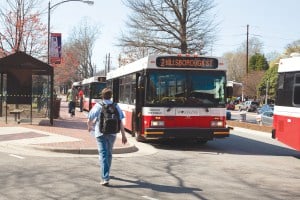
Photo courtesy of waketransit.com.
In response to ever-increasing traffic congestion, Wake County voters agreed on November 8 to raise the county’s sales tax rate by a half-cent to help fund the $2.3 billion Wake County Transit Plan. The local sales tax rate increase, from 6.75 percent to 7.25 percent, will begin in April 2017. GoTriangle, a regional transportation authority and provider, is in charge of levying the new tax.
On December 5, the Wake County Board of Commissioners officially authorized two key funding sources for the Wake County Transit Plan: a $3 increase in the Regional Transit Authority Registration Tax and a new $7 Wake County Vehicle Registration Tax. These local funding sources are in addition to the one-half percent local sales and use tax referendum.
Bus Service
The plan has been designed to better connect the Research Triangle Region and provide citizens with reliable, accessible, affordable public transportation. The plan will increase bus service; improve access between colleges, medical centers, RDU Airport, downtowns, and residential areas; and operate routes every 30 to 60 minutes.
The first phase of implementation of the transit plan will begin in the next year or so. The plan will include 30-minute bus service at stops in Cary, Morrisville, Research Triangle Park, Raleigh-Durham International Airport, and the Wake Tech Community College campus between Garner and Fuquay-Varina.
Hourly bus service will be provided at stops in Apex, Garner, Knightdale, and Wake Forest. Rolesville, Wendell, Zebulon, Fuquay-Varina and Holly Springs will also have hourly bus service, but only during weekday rush hours.
According to John Tallmadge, director of regional services development at Go Triangle, new buses will be ordered next summer and will arrive from the manufacturer 12 to 18 months later. “We will be looking at opportunities to extend service on routes later into the night and for more hours on weekends,” said Tallmadge. “We’ll also be considering providing more frequent service on some routes during the middle of the day or on weekends.”
Bus Rapid Transit
Bus Rapid Transit (BRT) is another component of the plan. BRT provides dedicated bus lanes on local roads, so bus operators can bypass traffic and keep their routes on schedule. Initially, the plan will construct approximately 20 miles of BRT-related infrastructure improvements, including New Bern Avenue between Raleigh Boulevard and WakeMed; Capital Boulevard between Peace Street and the Wake Forest Road intersection; South Wilmington Street towards Garner; and Western Boulevard between Raleigh and Cary.
Commuter Rail Transit
The plan also calls for the implementation of Commuter Rail Transit (CRT). CRT will utilize existing railroad tracks to provide passenger service that allows riders to relax or work on their way to key destinations. The initial plan is to have 37 miles of CRT in place from Garner to downtown Raleigh, N.C. State University, Cary, Morrisville, and the Research Triangle Park, continuing to Durham. During peak hours, there would be up to eight trips running in each direction; during midday and evening hours, there would be one or two trips running in each direction.
In addition, the plan will expand funding to the current Transportation and Rural Access (TRACS) demand-response system that serves the elderly and disabled throughout Wake County.
We at Real Estate Experts are excited about the prospect of new and improved transportation options in the Research Triangle Region, and look forward to seeing how the Wake Transit Plan will improve the quality of life for all of us!

